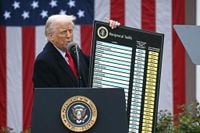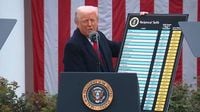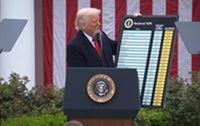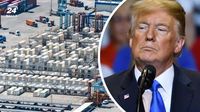In a bold move that is set to reshape international trade dynamics, U.S. President Donald Trump signed a decree on April 2, 2025, introducing new tariffs on goods imported from 183 countries and the European Union. This sweeping measure, which Trump has dubbed "America's Independence Day," varies tariffs from 10% to a staggering 50%, depending on the trade imbalances between the U.S. and the respective nations.
The new base tariff of 10% on all imports will take effect on April 5, 2025, impacting a wide range of foreign companies that bring their products into the U.S. market. Countries such as Great Britain, Singapore, Brazil, Australia, New Zealand, Turkey, Colombia, Argentina, the UAE, and Saudi Arabia will all be subject to this base rate. Interestingly, for Ukraine, the duty will also be set at 10%. According to Minister of Economy Yulia Sviridenko, the tariffs will disproportionately affect small producers, prompting the government to explore possible exemptions or adjustments to mitigate the impact.
In addition to the base tariffs, specific duties will be imposed on about 60 countries deemed "bad offenders" by the U.S. administration. These tariffs will come into effect on April 9, 2025, and include significant rates such as 54% for China, 46% for Vietnam, and 36% for Thailand. The European Union faces a 20% tariff, while Japan will incur a 24% duty. Notably, countries like Canada and Mexico are exempt from the base tariff due to existing special tariffs.
Under the new decree, foreign-made cars will also see tariffs rise by 25%, effective immediately as of midnight on April 3. This decision has raised eyebrows, particularly as Canada and Mexico, traditionally significant trade partners, are not included in the list of countries facing increased tariffs.
According to a report from 24 Kanal, these tariffs are expected to provoke economic upheaval worldwide. The implications of such sweeping changes could be profound, affecting not only U.S. consumers but also foreign economies that rely on exports to the American market.
In a related announcement, U.S. Treasury Secretary S. Bessent clarified that Russia and Belarus are not included in the new tariff lists due to the virtually nonexistent trade between the U.S. and these nations. However, the absence of clear political logic in tariff assignments has raised questions, particularly as countries like Iran, which also has minimal trade with the U.S., remain on the list.
High tariffs have been particularly damaging for developing economies, with Cambodia, Vietnam, and Sri Lanka facing record tariffs of up to 49%. Other countries affected by high tariffs include Bangladesh (37%), Thailand (36%), and China (34%). In contrast, countries such as the Democratic Republic of Congo, Cameroon, Chad, and Equatorial Guinea face tariffs as low as 11% to 14%.
Experts predict that the implementation of these new tariffs will trigger negotiations with affected countries, as the U.S. seeks to secure more favorable trade conditions. The administration's strategy appears aimed at reducing the trade deficit and restoring economic sovereignty, a sentiment echoed in the official White House documentation accompanying the decree.
The total trade turnover between Azerbaijan and the U.S. has seen significant growth, amounting to nearly $413 million in 2024. Azerbaijan, which has been a reliable trade partner, exports goods such as fruit juices, jams, textiles, and oil to the U.S. Meanwhile, the U.S. supplies a range of products, including automobiles and electrical equipment, to Azerbaijan. This mutually beneficial relationship highlights the complexities of international trade amidst rising tariffs.
As the world watches the unfolding trade war, the potential for retaliatory measures looms large. Countries affected by the tariffs may seek to impose their own duties on U.S. goods, leading to a tit-for-tat escalation that could further destabilize global markets. The stakes are high, and the outcome of this trade war could redefine economic relationships for years to come.
In summary, the U.S. government's new tariffs are a significant escalation in the ongoing trade tensions that have characterized recent years. As various countries brace for the economic impacts, the long-term consequences of these measures remain to be seen. With negotiations likely on the horizon, the international community will be watching closely to see how these changes will shape global trade dynamics.







